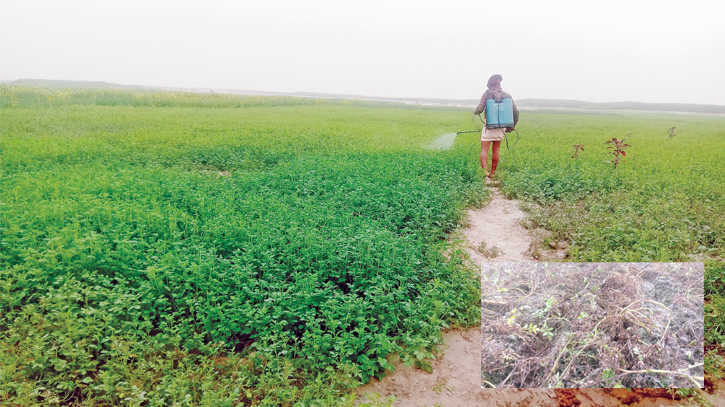
Photo : Messenger
The Tapur Char area of Dimla Upazila of Nilphamari is grappling with late blight in potato stems, worsened by severe winter conditions, leaving farmers distressed.
Late blight, a destructive disease affecting tomato and potato, has necessitated daily pesticide application, compounding the challenges posed by the harsh weather. The widespread fog has amplified concerns among farmers, impacting potato cultivation.
The dense fog in recent days has added to farmers' worries, instilling fear regarding the well-being of their potato cultivation. The Teestar Char in Nilphamari, located under Tepakhribari Union, has been identified as an agriculturally promising area, cultivating various crops such as potatoes, onions, ginger, garlic, chillies, and grains like rice, maize, wheat, and sesame.
Despite having three Assistant Agricultural Extension Officers in Tepakhribari Union, they are not readily available to assist farmers on-site. Farmers must either seek advice over the phone or visit pesticide sellers in the market to address concerns. Potato crops are particularly susceptible to rotting diseases and late blight, while the seedlings of Boro plants face cold injuries, causing discomfort among farmers during seedbed preparation due to adverse weather conditions.
Dimla Upazila Agriculture Officer Sekender Ali assures that everyone is vigilant in the field despite the challenging weather conditions. Efforts are underway at the field level, involving maintaining registers, documentation, and providing advice to farmers. Party and courtyard meetings have been intensified to address the challenges. Ali suggests that if the seedbed is rotting, farmers should water it at night and cover it with polythene.
According to the Upazila Agriculture Office, farmers are cultivating potatoes on 1,850 hectares of land in the upazila, with 300 hectares dedicated to early potato varieties. Ruman Ali, a farmer from Tapur Char, expresses frustration as he administers daily pesticide sprays without success. He laments having to give medicine to the potatoes in the cold winter. Seeking advice from agriculture officers involves making phone calls, and at times, farmers must visit pesticide shops for guidance.
Another farmer, Sheikh Farid, shares his struggles with providing medicine to his crops and expresses the difficulty of identifying diseases from a distance. He refrains from calling agriculture officers and opts to purchase medicine directly from the store. When contacted, Field Assistant Agriculture Officer Shahjahan Ali asserts that he regularly visits Ekta Bazar, offering advice and support to farmers. While he provides guidance over the phone, his physical presence in the fields is limited. The officer acknowledges the need to assess the extent of potato spoilage based on recent concerns raised by farmers.
The agricultural challenges faced by farmers in the Tapur Char area of Dimla Upazila underscore the complex interplay of severe winter conditions and the persistent threat of late blight on potato crops.
As farmers navigate these challenges, the need for accessible, on-ground agricultural support remains critical, especially in combating crop diseases exacerbated by severe weather conditions. Efforts to bridge this gap and fortify agricultural practices in adverse conditions will be crucial for sustaining livelihoods and ensuring food security in the region.
Messenger/Fameema








